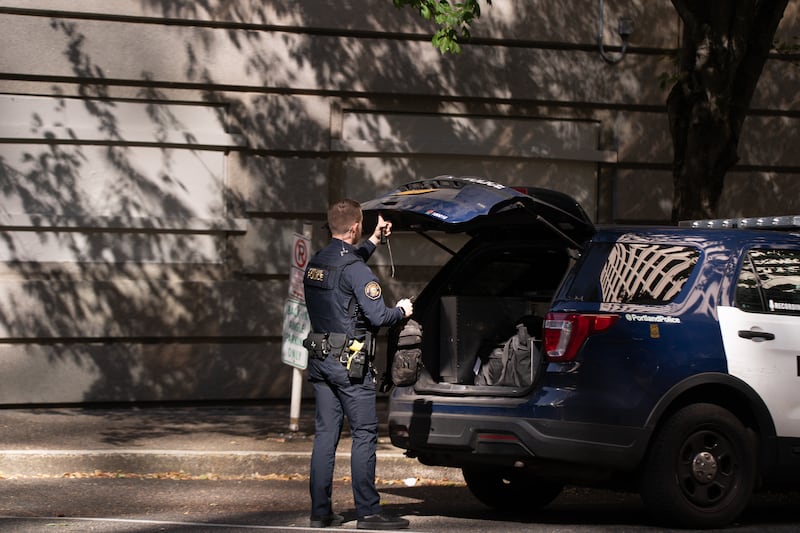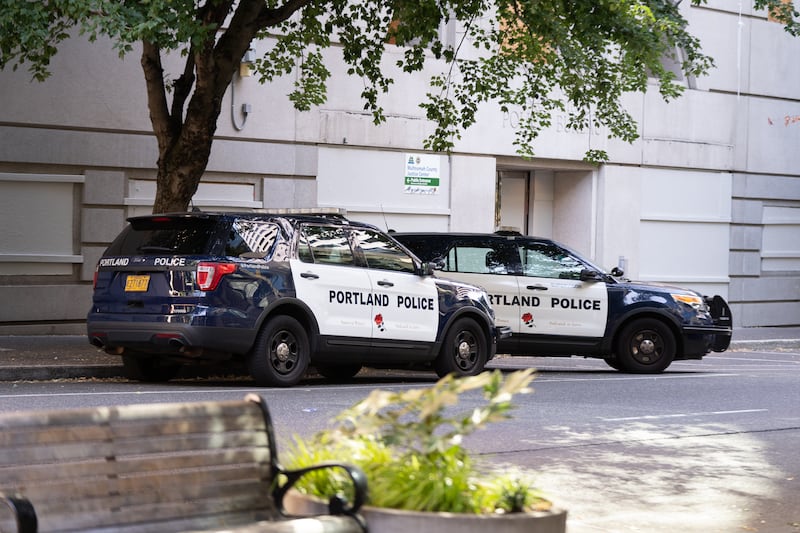It’s no secret many Portlanders have an uneasy relationship with police officers.
For eight years, Portland police have been under federal supervision for the force’s treatment of mentally ill citizens. Public trust was further frayed by riot cops’ violent response to the George Floyd protests in 2020.
Nowhere does that trust matter more than in a courtroom.
Police play a role often overlooked in the American criminal justice system. They don’t just bust bad guys; they also testify about them in court. And the testimony is often the most important evidence in a trial, determining whether a defendant will go free or serve some form of punishment.
And while they are only a small minority of the city’s 767 sworn officers, WW recently obtained records that name three currently employed Portland cops flagged by the Multnomah County district attorney for added scrutiny if they’re ever called to the stand.
The list is known informally as a “Brady list,” after a Supreme Court ruling in 1963 that requires prosecutors to disclose any evidence they have that might exonerate a defendant. These lists generally include names of officers who have a history of untrustworthiness that may need to be disclosed to defense attorneys. The Portland list also includes officers with criminal convictions.
The DA’s office does not have a centralized system for tracking whether witnesses end up testifying in court, so it could not immediately say whether any of these cops had done so.
The list has been obtained by news outlets before, but the names on it have received little notice and less scrutiny. In fact, the list was news to criminal defense lawyers WW spoke with.
“I don’t know of anybody who’s seen this list,” says Juan Chavez, a lawyer at the Oregon Justice Resource Center, “except the people you’re showing it to.”
The DA’s office created a database under Multnomah County District Attorney Mike Schmidt’s predecessor, Rod Underhill. Although most of the misconduct documented by the list has already been reported, the list, viewed in its entirety, seems to imply that untrustworthiness is a rare quality in public servants.
Or that it’s rarely discovered.
“What this shows us is that there are probably cops on the force who have lied, gotten away with it, and continue to testify in court,” says Dan Handelman of Portland Copwatch.

WW obtained a copy of the list from a former police officer and then requested and received an updated version of the list from the DA’s office, which it prefers to call a “Potential Impeachment Disclosure index.”
The DA’s office insists this isn’t a Brady list, because it includes officers convicted of a crime, not just those caught lying. Also, being added to the list does not bar prosecutors from calling you to the stand. (The DA keeps no other list, however.)
Sgt. Aaron Schmautz, president of the Portland police union, explained why the DA dislikes the term.
“A Brady list is a ‘do not call’ list where the person has been so ethically compromised that their word is mud,” he says. “This list is not that.”
Given the feds’ disdain for the Portland Police Bureau and the loose criteria for inclusion, the list is surprisingly short—only three active PPB officers are on it.
The lack of publicly available lists from other jurisdictions makes comparisons difficult if not impossible.
A couple of examples: Philadelphia prosecutors kept a list of dozens of people they will never, under any circumstances, call to the stand. Denver prosecutors provided WW a list of 321 names when asked for their Brady list, but many on the list had allegations in their records that were “unsustained,” according to the document.
Not surprisingly, defense lawyers think Multnomah County’s list should be longer.
“The idea that only three of Portland’s current police officers have a problem with honesty is a pretty embarrassing proposition,” says Charlie Peirson, a Portland public defender.
Officers make the list by failing a review by six prosecutors in the Multnomah County District Attorney’s Office. A decision to add a name to the list must be unanimous.
While anyone can propose a name for consideration, prosecutors say they don’t investigate allegations against officers.
“We do not investigate. We simply review documents that are provided to us,” says chief deputy district attorney Kirsten Snowden.
Snowden declined to say how many people had been reviewed for inclusion on the list.
“I think it’s a good process,” she says. “We understand that this can impact people’s careers, but we’re balancing that against our ethical obligations and our duty to disclose to a defense attorney.”
Yet the offenses that landed officers on the list are hardly the most shocking misdeeds ever chronicled at the Portland Police Bureau. Reading the supporting documents might cause a reader to wonder whether prosecutors are tracking the most troubling actions inside the cop shop.
Still, others were happy to hear that WW was publishing it.
“Brady lists, in general, are lists of cops who are liars,” says Alan Kessler, a lawyer who successfully sued the city last year to obtain the names of police officers on its riot squad. “If you publish that, I think you’d do a whole hell of a lot of good,” he added.
The list contains 33 names. At least seven still work for a public agency. In some cases, prosecutors noted, names of former police officers were added out of concern that they might one day be rehired.
In the following pages, we examine the cases of four police officers on the list. One of them retired while this story was being reported. There is also a firefighter, a probation officer, and two TriMet supervisors. (WW will examine the TriMet cases in a future issue.)
We believe it’s in the public interest for you to see what’s in the files—and to consider what isn’t.

Name: Andrew Caspar
Hired: 1998
Agency: Portland Police Bureau
Placed on the list: 2021
Status: Active
Some police officers lie because they are overeager to put a suspect behind bars. Andrew Caspar lied so he didn’t have to chase a suspect, city attorneys say.
In June 2019, Caspar and a trainee were getting coffee when dispatch said a homeowner in Multnomah Village had called in to report a man appearing to threaten a woman.
What happened next is recounted in a document called an arbitration award. When a police officer is disciplined or fired, their union often files a grievance—and an arbitrator makes a final decision. In this case, that decision and a memo detailing the rationale for Caspar’s original firing were forwarded to the prosecutor’s office.
The arbitration award says when the call came over the radio, Caspar got up and went to the restroom. His trainee later testified that Caspar, referring to the suspect, said to “wait until they get out of the neighborhood.”
The officers waited at least 15 minutes before driving to the scene. They found a shirtless man walking away and neighbors yelling, “Go get him!”
Caspar did nothing. Documents say Caspar admitted he told onlookers: “We don’t chase known suspects thanks to the Obama administration.”
But when a homeowner showed them a broken window and graffiti left by the fleeing vandal, Caspar and the trainee then set out on a search. They did not find the shirtless man.
Among the neighbors who saw Caspar’s actions that day: Rachel Novick, wife of former City Commissioner Steve Novick and, at the time, a researcher for Multnomah County’s Department of Community Justice. “I was like, I know he’s not supposed to do this,” Rachel Novick tells WW.
Caspar blamed his delay in arriving at the crime scene on rush-hour traffic, but GPS data analyzed by the city indicated otherwise, according to the arbitration documents. Caspar was fired in 2020 for a “pattern” of dishonesty, both during that call and during the investigation afterward.
After Caspar’s dismissal, his union intervened, and an arbitrator was “perhaps more sympathetic than the city,” he wrote in a July 2021 decision. He reinstated Caspar—with back pay.
A month later, prosecutors reviewed Caspar’s case and added him to the list, citing this incident. But, they wrote, they intend to continue calling Caspar to testify.
Caspar returned from a nearly two-year leave of absence in July 2021. That year, he earned $127,382. A police spokesman confirmed to WW that Caspar is still on the force.
Caspar, reached by telephone, declined to comment.
Name: Brian Hubbard
Hired: 1996
Agency: Portland Police Bureau
Placed on the list: 2018
Status: Active
On Feb. 6, 2009, Hubbard blew a 0.25% on a blood alcohol breath test, three times the legal limit, after driving his Chrysler into a ditch. A nearly empty 50 ml bottle of Smirnoff vodka was found next to him in the car (“Driving With Smirnoff,” WW, Aug. 11, 2009).
Hubbard got a DUII and pleaded guilty to reckless driving. He was sentenced to 18 months of probation and a $370 fine.
The Oregon Board on Police Standards and Training considered pulling his certification, but was won over by an apologetic letter he wrote to the board and a glowing review from then-Chief Rosie Sizer, according to a KGW report.
That DUII landed Hubbard, a 26-year veteran of the police force, on the list.
The police spokesman said he remains on the force today. Hubbard, through his union spokesman, declined to comment.
Name: John Shadron
Hired: 1999
Agency: Portland Police Bureau
Placed on the list: Date unknown
Status: Active
Shadron has compiled an eventful history behind the wheel.
On Jan. 10, 2010, Shadron, who has been a Portland cop for nearly 11 years, chased a former girlfriend through Gresham, weaving through traffic and driving in the bike lane, according to an account in The Oregonian of the prosecutor’s testimony. Shadron pleaded guilty to careless driving and was fined.
In November that same year, he rear-ended a truck stopped at a red light, injuring the driver. Shadron was drunk and was charged not only with a DUII but also assault.
Judge Michael McShane sentenced Shadron to probation and 120 hours of community service.
The state certification board reviewed Shadron’s case in 2012, determined that he had committed “gross misconduct,” but its police policy committee still voted unanimously to keep Shadron on the force.
Prosecutors added him to their list, but do not have record of when.
Shadron is still on the force. He declined to comment through his union spokesman.
Name: Rachel Andrew
Hired: 1994
Agency: Portland Police Bureau
Placed on the list: 2018
Status: Retired
Andrew is one of the few people added to the list to appeal the decision, prosecutors say. Her appeal, like all others, failed.
She made the list for misconduct that included allegedly lying about a phone call in which she berated a subordinate officer for allegedly skipping work to do a filmed interview with America’s Most Wanted, according to lawsuits filed by Andrew and the subordinate.
That subordinate was Sgt. Doug Justus. Justus investigated sex trafficking cases for the Police Bureau’s vice unit and had a flair for self-promotion. In 2010, he’d been interviewed by Dan Rather for a news segment on AXS TV entitled “Pornland, Oregon” in which Justus said the “very liberal” city had indulged a rampant sex trafficking problem.
That same year, Justus traveled to Washington state to be interviewed on America’s Most Wanted and brought ABC’s Nightline along on an undercover sting. Andrew was livid and, according to Justus, berated him over the phone.
Andrew claims Justus yelled at her.
Then-Capt. Chris Davis accused Andrew of lying about Justus’ demeanor on the phone. Then-Chief Mike Reese sided with Davis and suspended Andrew for two weeks.
In a 2014 lawsuit, Andrew claimed this discipline was retaliation: Four years prior to the Nightline dispute, she had recommended disciplining Davis for allowing the improper use of an informant. Her lawsuit claimed Davis and Reese wanted revenge.
In 2018, prosecutors reviewed her case file. They decided to add her to the list given “the amount of disciplinary material reviewed.” State records show Andrew had two leaves of absence in the mid-2000s for reasons WW was unable to determine.
Andrew retired as a lieutenant in the Portland Police Bureau last month after a 28-year career. A request for comment through her attorney, Sean Riddell, was declined.
Reese is now the Multnomah County sheriff. A sheriff spokesperson says Reese “disputes the allegations” and noted that Andrew dropped the lawsuit.
Davis rose to the rank of deputy chief before switching jobs in 2021. He’s now chief of the Green Bay Police Department in Wisconsin. He directed WW to existing records and declined to comment.
Name: Kevin Novinger
Hired: 2016
Agency: Multnomah County Department of Community Justice
Placed on the list: 2021
Status: Active
Of all the cases that landed people on this list, probation officer Kevin Novinger’s is perhaps the most sensitive.
He was accused of rape—and cleared. But in the process, the county says, he lied about what had happened.
On St. Patrick’s Day 2017, Novinger and his girlfriend, a co-worker, went home after “three or four hours” of drinking at Kells Irish Pub downtown. They had sex.
The next day, according to an arbitrator’s report, Novinger’s girlfriend called two of her friends, “very upset.” Novinger, she said, had anal sex with her without her consent.
Three months later, they broke up. Nine months after that, she filed a sexual assault report with the Hillsboro Police Department, which assigned a detective. He wrote up a report and forwarded it to Washington County prosecutors, who declined to press charges. Meanwhile, the county hired an independent investigator who concluded it was “more likely than not” that Novinger was lying and the couple had, in fact, had anal sex.
Novinger was fired by Multnomah County, but his union appealed. And Novinger was reinstated, an arbitrator noting that Novinger had been a “role model” during the four years he’d been employed for the county and that if he did lie, it was not “in the line of duty.”
Nevertheless, prosecutors added Novinger to the list in 2021 and, according to their memo documenting the decision, intend to continue calling him as a witness at criminal trials regardless.
Earlier this month, WW called Novinger at his office, where he still works for the Multnomah County Department of Community Justice as a probation officer. There are 40 people currently under his supervision.
Novinger confirmed he was still employed, but declined to comment on the incident.
Name: Nicholas Perkins
Hired: 2007
Agency: Portland Fire & Rescue
Placed on the list: 2020
Status: Active
Perkins is a Portland firefighter who infamously went on a drunken, racist tirade in 2019 while at a conference in Tennessee on taxpayers’ dime (“What Happens in Nashville,” WW, Aug. 4, 2020).
In the wee hours of Aug. 18, 2019, Perkins was drunk and locked out of the Gaylord Opryland Resort. He’d started the night at a brewery and ended at “honky-tonks,” he later told investigators. At 4 am, he returned to the hotel and attempted to open the door using a credit card instead of his room key.
He yelled at the hotel clerk: “I have my key, you black bitch…you black n—r, open the door!”
Police were called and Perkins was sent home early from the physical and mental health conference (which Portland had paid $2,300 for him to attend).
Fire bureau higher-ups were divided on what to do with Perkins. The professional standards chief interviewed Perkins and found his remorse credible. The division chief responsible for training wanted him fired.
The city commissioner who runs the fire bureau, Jo Ann Hardesty, initially wanted him gone too, she told WW at the time.
But Perkins’ union stood up for him. “We are absolutely taking somebody’s life and ruining it based upon a he-said-she-said situation,” union president Alan Ferschweiler told Fire Chief Sara Boone.
Boone suspended Perkins for six months without pay. She told WW in 2020 that she believed Perkins was capable of redemption and could be a positive example going forward.
“As a Black person in a white institution, you have to create the change you want to see,” she said.
A city official confirmed to WW that as of earlier this month, Perkins is still employed at the fire bureau. Last year, he earned $134,677.
Even so, The Multnomah County DA reviewed his case in 2020 and determined that the “egregious and serious offense” would likely be admissible in court if Perkins was ever called to testify. They added him to the list.

